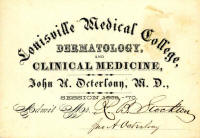John A. Octerlong, M.D.
Click image to enlarge
Former Faculty Members Louisville Medical College
Former faculty members of the Department of Pharmacology and Toxicology
Octerlong, John A., M.D.1870-1874, Professor of Materia Medica and Therapeutics, and Clinical Medicine
Congressional record for Freedmen: A hospital was established in this city early in July last for the adm'saion of the indigent sick refugees and freed men of the whole Sta'e. A dispensary was also established in Louisville during the month of August for the distribution of medicine to the same cbu-s in this city. Both of these institutions are ander the supervision of Brevet Major F. 8. Town, assistant surgeon United State« army, who is assisted by Dr. R. A. Bell, contract surgeon in charge of the hospital,and Dr. John A. Octerlong, also a contract surgeon, in charge of the dispensa y, who visits freedmen outside of the hospital who apply to the dispensary lor medical attendance. Number of patients admitted into the hospital 304
________________________
From the Medical and Surgical History:
CASE 169.---Corporal John J. English, 5th Indiana Battery, was wounded at Murfreesboro', December 31, 1862, by a musket ball, which entered the left inguinal region. He was taken to the field hospital of the 2d division. Fourteenth Corps. The situation of the ball could 'not be determined, but, from the absence of grave symptoms, Surgeon J. L. Teed, 38th Illinois, hoped that the missile had not penetrated the peritoneal cavity, and, on January 5, 1863, the patient was sent to Nashville. Here Surgeon Charles Schuessler, 6th Indiana, recorded the wound of the left groin as severe and probably penetrating. Still there were no very grave symptoms, and, on the 18th, the patient was transferred to Louisville, to Hospital No. 8. Acting Assistant Surgeon Octerlong describes the wound as severe and situated in the ]eft inguinal region; but gives no particulars of the progress or incidents of the case, which terminated fatally, July 28, 1863, no notes of an autopsy being preserved. Medical Inspector Hamilton, however, states (Am. Med. Times, Vol. VII, p. 186) that "the ball escaped from the rectum on the fortieth day," that it was "a conical ball, which entered just below and in front of the anterior superior spinous process of the ilium, on the left side," and that "when I saw Corporal English he was in bed, the wound in front had closed, but matter continued to discharge by the rectum. His bowels were regular; but he was obliged to urinate often, and urination was attended with some pain. His health was steadily improving, and there was but little reason to doubt his final and complete recovery. The ball, which he showed me, was a little battered."
